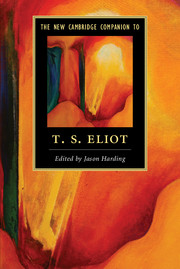Book contents
- Frontmatter
- Contents
- Notes on contributors
- Preface
- Chronology of Eliot's life and works
- List of abbreviations
- 1 Unravelling Eliot
- 2 Eliot: Form and Allusion
- 3 Prufrock and Other Observations
- 4 Banishing the Backward Devils: Eliot's Quatrain Poems and “Gerontion”
- 5 With Automatic Hand: The Waste Land
- 6 “Let These Words Answer”: Ash-Wednesday and the Ariel Poems
- 7 Four Quartets
- 8 “A Precise Way of Thinking and Feeling”: Eliot and Verse Drama 116
- 9 T. S. Eliot as Literary Critic
- 10 T. S. Eliot's Social Criticism
- 11 Gender and Sexuality
- 12 Eliot's Philosophical Studies: Bergson, Frazer, Bradley
- 13 “Anglo-Catholic in Religion”: T. S. Eliot and Christianity
- Select bibliography
- Index
- Miscellaneous Endmatter
6 - “Let These Words Answer”: Ash-Wednesday and the Ariel Poems
Published online by Cambridge University Press: 01 December 2016
- Frontmatter
- Contents
- Notes on contributors
- Preface
- Chronology of Eliot's life and works
- List of abbreviations
- 1 Unravelling Eliot
- 2 Eliot: Form and Allusion
- 3 Prufrock and Other Observations
- 4 Banishing the Backward Devils: Eliot's Quatrain Poems and “Gerontion”
- 5 With Automatic Hand: The Waste Land
- 6 “Let These Words Answer”: Ash-Wednesday and the Ariel Poems
- 7 Four Quartets
- 8 “A Precise Way of Thinking and Feeling”: Eliot and Verse Drama 116
- 9 T. S. Eliot as Literary Critic
- 10 T. S. Eliot's Social Criticism
- 11 Gender and Sexuality
- 12 Eliot's Philosophical Studies: Bergson, Frazer, Bradley
- 13 “Anglo-Catholic in Religion”: T. S. Eliot and Christianity
- Select bibliography
- Index
- Miscellaneous Endmatter
Summary
“A thin, firm minor music, of ceremonious intricacy, dissolving the world of Tiresias, Hamlet, and Mrs. Equitone”; “a visionary precision”; “a wholly transparent network of allusions, tacitly nourished”; “a religious poem which contains no slovenly phrase, no borrowed zeal, no formulated piety.” This is Hugh Kenner's description of the poem he identified as marking a departure from the conversational rhythms and “gritty substantiality” of Eliot's earlier writing. Ash-Wednesday (1930) marks a shift in Eliot's poetics away from the urbanity and Laforguean disaffection of his youth toward the lyrical assurance and meditative transcendence of Four Quartets. A religious poem devoid of dogma, Ash-Wednesday enacts the renunciatory suffering of the supplicant as the poetic consciousness strains to turn inward, forsaking the sensual life of memory and desire. It is a poem fundamentally concerned with alterations in state, with the painful processes of becoming, and with the subtle permutations of the changed and changing self. In seeking for an altered means of expression for his religious impulse, Eliot created a new language of spiritual lucency that becomes a form of metaphysical aspiration. In its wavering between personal and impersonal, in its subtle dream-like ellipses and sudden shifts in register, and in its syntactical involutions and recursions, Ash-Wednesday engenders a spiritual process in which poem and experience are often indistinguishable.
In the Christian calendar Ash Wednesday is a day of introspection and penitence. It marks the commencement of Lent, a liturgical period of forty days of prayer and abstinence that recalls the fasting and temptation of Jesus in the wilderness. The title Ash-Wednesday might therefore be expected to proclaim a public, ceremonial role for the poem in keeping with its uses of the Anglican Liturgy and the sermons of seventeenth-century Bishop Lancelot Andrewes, who preached before the court of King James I. Yet the poem eschews an explicitly ecclesiastical context and its recourse to liturgy only commences at the conclusion of the opening section (“Pray for us sinners now and at the hour of our death / Pray for us now and at the hour of our death” [CPP 90]). The voices of the Hebrew prophets Ezekiel, Jeremiah, and Micah toll through the poem's other, stranger musics: Catholic prayers interwoven with Dante, eighteenth-century fairy tale, Elizabethan verse, and Symbolist aestheticism in a characteristically eclectic assemblage of fragments.
- Type
- Chapter
- Information
- The New Cambridge Companion to T. S. Eliot , pp. 89 - 102Publisher: Cambridge University PressPrint publication year: 2016



